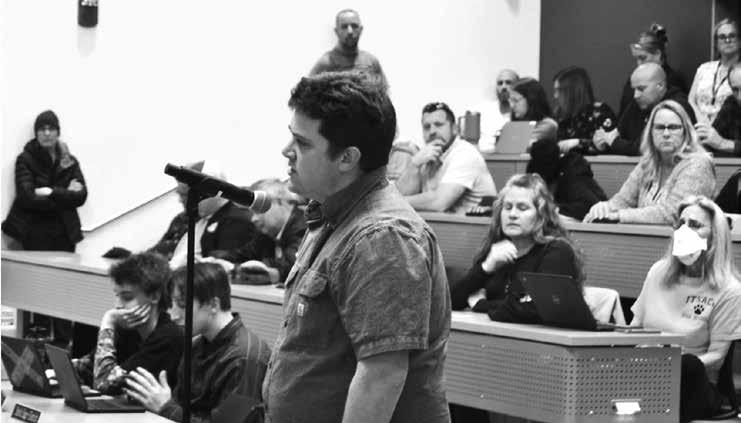Amid Community Uproar, School Board Reduces Tax Levy Increase


8-9
PAGES
COUNTY TO EXPAND BROADBAND SERVICE PAGE 3 COUNCIL APPROVES GREEN HYDROGEN ENERGY PROJECT PAGE 4 COUNCIL TO APPROVE JUSTICE50 FRAMEWORK PAGE 5 ASPIRE CANNABIS DISPENSARY OPENS PAGE 11 BusinessTimes
WHAT DO RESIDENTS SAY ABOUT US?
FLY LOCAL, FLY LOCAL, REACH FAR! REACH FAR!
ITH ITH
Ithaca Tompkins Ithaca Tompkins International Airport International Airport
From hassle-free parking to friendly staff, we're here to make your journey a breeze.
Fly wITH us and see the difference!

100881_AMI_SrcCode_AD_IT ( Ithaca Times )
T: 10” x 5.5” B: - L: 0.25” margins 4c





 - Mary
- Mary

Website: www.kai.kendal.org, Email: admissions@kai.kendal.org or call (607) 266-5300 2230 N. Triphammer Road џ Ithaca, NY 14850-6513
Connect with us on Facebook


Smart is getting a bill for your actual use. Every month, no surprises.




















Smart meters automatically submit your actual energy use to us so you're only paying for what you use every month. It’s that simple.
Learn more about smart meters at nyseg.com/smartmeters


smartiseasy easy
2 T he I T haca T I mes / a pr I l 24 – 30, 2024
100881_AMI_SrcCode_AD_IT.indd 1 3/27/24 9:36 AM
Living at Kendal of Ithaca has been excellent in every way. Getting old isn’t easy. Being here makes me feel safe and secure. It’s the best long term health insurance plan.
Tompkins County Moves Towards Closing the Broadband Internet Access Gap
By Matt Dougherty
In a significant move towards bridging the digital divide, Tompkins County is pushing forward with plans to expand high-speed broadband internet access to unserved addresses. The initiative aims to address the gap in internet connectivity that has long hindered residents’ access to essential online services and opportunities.
In a unanimous 14-0 vote, the Legislature approved a resolution authorizing a partnership with Point Broadband to expand high-speed internet service to unserved addresses in the County. The resolution calls for $100,000 to be spent by Point Broadband to complete a preliminary engineering study, opening the ability to access New York State funding to develop the infrastructure to serve approximately 1,216 locations in the County not currently served by wired broadband.
Groton, Lansing, Ithaca, Danby, Newfield, Enfield, and Ulysses. Funding for the proposal is expected to come from a combination of sources, including state grants and potentially county funds. Mezey reassured legislators that efforts would be made to minimize the financial burden on the county, with the hope that the project could ultimately cost Tompkins County nothing if state funding is secured.
Chairman of the Legislature Dan Klein agreed with Mezey, saying, “There is a scenario where this whole seven-and-a-half million dollar project [could] cost Tompkins County zero dollars.”
“There is a scenario where this whole seven-and-a-half million dollar project [could] cost Tompkins County zero dollars.”
— Dan Klein
Legislator Greg Mezey said, “This $100,000 [will fund] the fieldwork to get out into the community and understand the detailed engineering nuts and bolts of infrastructure and system needs.”
The total cost of the ambitious broadband expansion project is estimated at $7.5 million, making it a substantial investment aimed at reaching underserved households in Tompkins County and neighboring towns such as
The urgency of expanding broadband access stems from the stark reality that many Tompkins County residents currently lack reliable internet connectivity. According to recent data, many households in rural and underserved areas cannot access high-speed internet, severely limiting their ability to participate in online education, telecommuting, telehealth services, and other digital platforms essential for modern living.
However, achieving widespread broadband access is fraught with complexities and challenges. One major hurdle highlighted during the meeting was navigating existing agreements and partnerships, particularly with municipal broadband providers like Haefele Connect and Dryden
T ake N ote
X Cornell Students Pass Ceasefire/Divestment Referendum
Cornell University's undergraduate student body voted overwhelmingly in favor of a resolution calling for the university to support a permanent ceasefire in Gaza and divestment from major weapons manufacturers. The referendum, which saw a participation rate of 46.77%, resulted in a 2:1 ratio in favor of the resolution.
According to the referendum results, 5,043 votes were cast in support of Cornell calling for a permanent ceasefire in Gaza, and 2,074 votes were cast in opposition.
Additionally, the results found that 4,960 votes were cast in favor of Cornell following their 2016
Guidelines for Divestment and divesting from weapons manufacturers complicit in the ongoing violence in Gaza, and 2,193 votes were cast in opposition.
The weapons manufacturers targeted specifically include BAE Systems, Boeing, Elbit Systems, General Dynamics, L3Harris Technologies, Leonardo, Lockheed Martin, Northrop Grumman, RTX, and ThyssenKrupp.
The Cornell Coalition for Mutual Liberation (CML) spearheaded the resolution, which consists of more than 40 student organizations. CML has organized dozens of events calling for the

Fiber. Mezey underscored the importance of cooperation and coordination to ensure that the expansion efforts do not inadvertently disrupt or duplicate existing services.
Specifically, most residents in the Town of Enfield are happy with their broadband service from Haefele. However, a group of households within Haefele’s coverage area still don’t have service. As a result, Point Broadband representative Chuck Bartosh has said that he is interested in working with Haefele to expand service to the underserved group without needing to “overbuild” in the area. Additionally, Bartosh has assured residents already served by providers like Haefele that they would not lose access to their current services.
Despite the complexities involved, there was widespread support for the broadband expansion initiative. However, Legislator Rich John sought clarification on funding commitments, saying that if grant funding for the broadband expansion project is not
Continued on Page 12
university to support a ceasefire and divest from weapons manufacturers since Israel’s war in Gaza began in the wake of the Hamas attack on October 7.
The Student Assembly previously voted 16-4 against a resolution calling for divestment at a meeting on February 1. Then, on March 21, the Student Assembly voted 15-10 to hold the referendum on divestment from April 18-19.
Now that students have passed the resolution, Cornell University President Martha Pollack will have the opportunity to implement a policy concerning it within 30 days or reject it entirely.
a pr I l 24 – 30, 2024 / T he I T haca T I mes 3 VOL. XLIII / NO. 86 / April 24, 2024 Serving 47,125 readers weekly N ews line ON THE WEB Visit our website at www.ithaca.com for more news, arts, sports and photos. Call us at 607-277-7000 M att D ougherty , M anaging E ditor , x 1217 E ditor @ i thaca t im E s com C hris i bert C al E ndar E ditor , a rts @ i thaca t im E s com M a DD y V ogel , n E ws r E port E r , x 1225 r E port E r @ i thaca t im E s com K enneth W aterhouse , p hotograph E r s te V e l a W ren C e , s ports C olu M nist s t E v E s ports d ud E @ gmail com J i M b ilins K i , p ublish E r , x 1210 jbilinski @ i thaca t im E s com l arry h o C hberger , a sso C iat E p ublish E r , x 1214 larry @ i thaca t im E s com F r EE lan CE rs : Barbara Adams, Stephen Burke, G. M Burns, Alyssa Denger, Jane Dieckmann, Charley Githler, Ross Haarstad, Steve Lawrence, Marjorie Olds, Henry Stark, and Arthur Whitman THE ENTIRE CONTENTS OF THE ITHACA TIMES ARE COPYRIGHT © 2024, BY NEWSKI INC. All rights reserved. Events are listed free of charge in TimesTable. All copy must be received by Friday at noon. The Ithaca Times is available free of charge from various locations around Ithaca. Additional copies may be purchased from the Ithaca Times offices for $1. SUBSCRIPTIONS: $89 one year. Include check or money order and mail to the Ithaca Times, PO Box 27, Ithaca, NY 14851. ADVERTISING: Deadlines are Monday 5 p.m. for display, Tuesday at noon for classified. Advertisers should check their ad on publication. The Ithaca Times will not be liable for failure to publish an ad, for typographical error, or errors in publication except to the extent of the cost of the space in which the actual error appeared in the first insertion. The publisher reserves the right to refuse advertising for any reason and to alter advertising copy or graphics deemed unacceptable for publication. The Ithaca Times is published weekly Wednesday mornings. Offices are located at 109 N. Cayuga Street, Ithaca, NY 14850 607-277-7000, FAX 607277-1012, MAILING ADDRESS is PO Box 27, Ithaca, NY 14851. The Ithaca Times was preceded by the Ithaca New Times (1972–1978) and The Good Times Gazette (1973–1978), combined in 1978. FoundEr good t MEs gazEttE: toM neWton ON THE COVER: Member of the public Charlie O’Connor cited the Ithaca Times‚ reporting when raising his concerns regarding the school district’s budget. (Photo: Maddy Vogel) NEWSLINE �������������������������������� 3-4, 6 LETTERS TO THE EDITOR ������������ 5 COMMUNITY CONNECTIONS 7 SPORTS ������������������������������������������� 10 BUSINESS TIMES ��������������������� 11-12 ARTS & ENTERTAINMENT 13 ОPERA �������������������������������������������� 14 CLASSIFIED ������������������������������ 16-17 TIMES TABLE 18-19
Tompkins County Legislator Greg Mezey has been an advocate of expanding broadband access in Tompkins County.
By Kenneth Waterhouse
QUESTION OF THE WEEK:
WHAT WOULD YOU NAME
THIS CHAPTER OF YOUR LIFE?





Ithaca Moves Forward with Green Hydrogen Fuel Project & Allocates Funding to Ithaca BikeShare
By Matt Dougherty
At its meeting on April 17, the Ithaca Common Council voted to authorize $526,000 in bonds to support a green hydrogen fuel pilot project. The project, titled “Green Hydrogen as a Non-Wires Alternative Pilot™ Project,” aims to advance Ithaca’s goals under the Green New Deal to reduce carbon emissions and transition to renewable energy.
The Council also approved allocating $75,000 from the project to support Ithaca BikeShare’s continuing operations, as NYSEG has announced that it will be ending its support for the local micro-mobility program.
Green hydrogen fuel is made through a process called electrolysis, in which solar power splits water molecules into hydrogen and oxygen. The hydrogen can then be stored and used as a clean-burning fuel for applications like powering electric vehicles.
The city’s project will install a solar panel array at the SouthWorks property — which is a sub-recipient of the project — that will provide electricity to the local grid and an on-site electrolyzer. The electrolyzer will produce hydrogen gas that will be stored for use in fueling future electric TCAT buses, trucks, or other vehicles.
The City of Ithaca’s Sustainability Director, Rebecca Evans, has said that the project is “a creative way to create electricity with minimal impact on resources and zero impact on the grid.” She continued saying, “This is a way to be able to fuel future electric TCAT buses or school buses. There are a million different uses without passing on that cost to ratepayers.”
Standard Hydrogen Corporation will oversee the engineering and Shift Capital will manage the on-site construction aspects. The total cost is estimated at $10 million, with $1 million to be covered by this city bond issuance. Any additional costs would be reimbursed by a Department of Energy grant. According to the project description, key activities associated with Budget Periods One and Two have already begun. These activities, which are slated to conclude in March 2025, cost $526,503.00.
Evans said, “The reason that I’m only asking for half of the money now is to try and minimize the cost of interest over time since this is a four-year project. I will come back for the other half in one-and-a-half or two years.”
City officials believe the project is an innovative way to reduce emissions and reliance on fossil fuels without overburdening utility ratepayers. It could also help transition Ithaca’s municipal fleet to electric vehicles — a goal that has hit a roadblock as TCAT recently had to decommission seven electric buses purchased from the nowbankrupt Proterra for roughly $1 million each. To make up for the loss of the electric buses, TCAT has decided to purchase five new diesel buses at a cost of roughly $500,000 each. While the addition of diesel buses will delay the transportation agency’s goal of transitioning to a carbon-free fleet by 2035, TCAT’s new General Manager, Matthew Rosenbloom-Jones, has said that the top priority right now is having reliable service. “The best way to achieve that is with a mixed fleet,” he said.
In the face of this setback, the council voted unanimously to support moving the green hydrogen project forward to provide additional support to the community to meet its Green New Deal goals.
The $526,000 in bonding approved at the April 17 meeting provides the initial funding to begin engineering and site work. City staff will work with Standard Hydrogen Corporation on the engineering phase and Shift Capital for construction management.
Funding for Ithaca BikeShare was also discussed in relation to the green hydrogen fuel project because part of the community engagement funding allocated through the project would go towards supporting BikeShare. Evans has proposed pulling $75,000 from the project’s community engagement budget to keep Ithaca Bikeshare operational for another year. The move was presented as an urgent need because the previous sponsor, NYSEG, has decided to end their funding of the program.
“NYSEG has pulled their funding, so we will be sponsoring 50% of the cost of that,” Evans said. She continued saying, “I am actively trying to find additional sponsors to ensure that Ithaca BikeShare can continue operations.” According to Evans, the $75,000 will fund about half of BikeShare’s $150,000 operating costs. She also said another $50,000 will be pulled from the green hydrogen project in the fall to roll out a “community census survey.”
Evans says that this survey will help the City “better identify climate justice com-

munities and layer in additional information that we have from the Census and the American Community Survey so that we can better divert funding or allocate funding from various budgets, including the Green New Deal.”
In response to questions regarding the necessity of using funds from the Green Hydrogen project to support BikeShare, Evans explained that BikeShare ridership numbers have shown that low-income residents heavily use it because it helps to provide low-cost transportation options. Additionally, Evans says that supporting Bikeshare through the hydrogen project funds would help advance the Green New Deal’s goals of reducing emissions and increasing carbon-free mobility options for all communities.
First Ward Alderperson Kayla Matos expressed support for using funds to support BikeShare, saying, “I think that if all of us can come together and support nonprofit organizations by providing them funding from a bond that is not really going to make a huge budgetary impact on us then we should do it.”
Fourth Ward Alderperson Tiffany Kumar agreed with Matos, saying, “I think that this is an extremely important program that is not only heavily used, but also really does have an impact in terms of what we’re trying to get done here [with the Green New Deal.]”
While no additional authorization from the Council is required at the moment, the council did ask city staff to periodically report on the project’s progress and spending as part of their oversight of the Green New Deal initiatives.
The project is expected to be completed in phases over the next four years as the engineering, site work, and initial year of operations are carried out.
4 T he I T haca T I mes / a pr I l 24 – 30, 2024 N ewsline IN UIRING
PHOTOGR PHER Q A
“The growth period.”
– Matt D.
“Graduate ASAP.”
– Stella F.
“Printemps, Spring time.”
– David R.
“Renewal.”
– Deserie Q.
“Base reconstruction and rebuild inspection.”
– Manny Q.
Sustainability Director Rebecca Evans says that the Green Hydrogen project could help power future electric TCAT and school buses. She added that funds from the project will be used to support Ithaca BikeShare as NYSEG pulls their sponsorship of the program.
LETTERS TO THE EDITOR
RE: ICSD Taxes
“I am writing to express my concern about the proposed ICSD budget for the next school year. To pay for the budget requires the tax levy to increase by 12%. This is incredibly difficult for a retired educator. With all my respect and admiration for teachers, I would like to know more about how the school and its leadership perform.
The National Center for Education Statistics published in January 2024 that Public school leaders nationwide reported that their average daily attendance rate for students is dropping. There are concerns that are related to student and teacher attendance and absences. Extreme concern related to teacher and non-teaching staff absences was also reported. I would like to know what is the percentage of absences in students and teachers in 2023 and how it compares to pre-pandemic years. Are we doing enough to encourage students attending school and teachers showing up for work? Also how are the schools per-
forming in the rate of graduation in a post pandemic era.” — Concerned Citizen
“As a hardworking farmer (and former teacher), I was glad the School Board rejected an overpriced budget.
If Luvelle Brown truly cares about students and teaches, he can reduce the budget by $242.823 (his exorbitant annual salary) plus his fringe benefits, by voluntarily resigning.
Any elementary principal in the district has the qualifications and intelligence to do his job without the animosity he's engendered.
Any school bus driver or cafeteria worker can do a better job managing and encouraging kids.
Who greets sleepy hungry kids with “Good morning, how’re you doing today?” Bus drivers and cafeteria workers understand many kids attend school mainly for free lunch, and be in a warm building for 8 hours because parents can't afford utilities or groceries.
When I VOTE May 21, it will be to REJECT the school budget which is still far too high.
I will pay for bus drivers, teachers, aides and ONE Principal per building, but NOT LuVelle Brown.
Only when he voluntarily resigns, will Ithaca voters pass the budget.
I applaud the brave ICSD teachers who wrote letters to the editor against ICSD

renewing his contract.
ICSD is desperate for teachers. I’m well qualified, but who wants to work for Luvelle Brown?
In my 35 years paying school taxes this is the first time I’ve campaigned against ICSD, which is still OUT OF TOUCH WITH REALITY.” — Clare Forest
“It’s time the taxpayers knew what’s going on with their money. Check out seethroughny and look at Brown’s contract.
The district needs to cut administration all the way my family started working there in 1961 and I still have family working at ICSD today. Back in 1985 there were only 4 administrators running the school district. The superintendent, Assistant superintendent, Business manager, and Personnel director. It was back then that teachers and other staff were getting 8% raises while administrators got 2-3% raises and the district was doing a lot better academically. Today they can't keep staff that long due to the way Brown has cut everything to fill his pockets. Get him out of there now.” — Concerned Taxpayer
RE: Opposition to Lake Street Townhouse Project
“Thank you for your article on the issues of toxic contamination affecting the site of the proposed Lake Street Townhomes. This certainly is one issue that argues against its approval by the Planning Board. Another issue is the Ithaca Falls parking lot. If you have ever used this small parking area to bring young children to view the city’s most visited natural wonder, to access the creek for fishing, or have driven from out of town to walk to the falls, read on. This proposed development will affect you.
Lake Street Townhomes will consist of 16 units, each with 3-4 bedrooms. In a college town, this suggests student housing, with the possibility of 48-60 residents. The developer plans to provide 16 parking spaces adjacent to the site by repaving City property (Lincoln Street Extension) for access. This in itself will eliminate 3 spaces in the City’s Ithaca Falls parking area. This parking area is small, but popular. It is after all, the only legitimate parking area for anyone who has driven from near or far to see the falls. To forestall townhouse residents, or their visitors, from parking in the convenient adjacent City lot, the developers have allotted 16 spaces in their parking lot up the hill. Given the drawbacks of schlepping up and down the
UPS DOWNS& Ups

The NY State 4-H Annual Duck Race community fundraiser is taking place this Sunday, April 28 from 11 a.m. to 4 p.m. at Cornell Cooperative Extension (CCE) Tompkins County, 615 Willow Ave in Ithaca.

Ups
On May 1, competitors at the annual Mac ‘N Cheese Bowl will transform this popular side dish into a creative canvas, tickling Ithacans’ tastebuds at this fundraiser for Foodnet Meals on Wheels. The eleventh offering of this event will be at the Ithaca Farmers Market Pavilion from 4:30 until 5 p.m. next Wednesday.
HEARD SEEN& Heard

The Ithaca club of the Communist Party USA, along with community members, local unions, and other progressive organizations, will gather on the Ithaca Commons in celebration of International Workers Day on Wednesday, May 1st from 4-7 p.m. at the Bernie Milton Pavilion.

Seen
Census data shows that Ithaca has the youngest population in the state of New York. While many areas throughout N.Y. and the United States are aging at a faster rate than in previous years, Ithaca's large college population has helped the city's population remain youthful, which experts say has impacts on the area's economy, political representation, and workforce.
IF YOU CARE TO RESPOND to something in this column, or suggest your own praise or blame, write news@ithacatimes. com, with a subject head “U&D.”
QUESTION OF THE WEEK
Should the City widen downtown sidewalks to increase accessibility and add plantings?
59 . 3 % Yes.
32.2% No.
8 . 5 % I don’t care.

N ext W eek ’s Q uestio N : Should the City add dedicated bike lanes throughout downtown streets? Visit
a pr I l 24 – 30, 2024 / T he I T haca T I mes 5
to submit your response. Continued on Page 6 The Talk at
ithaca.com
Ithaca Council to Approve Justice50 Budgeting Framework in May
By Matt Dougherty
In a unanimous vote at their April 17 meeting, the Ithaca Common Council approved sending the Justice50 policy to guide city budgeting to its May 1 meeting for a final vote.
Ithaca’s Justice50 initiative, modeled after the federal Justice40 program, aims to allocate at least 50% of funding for Green New Deal programs and capital projects to benefit designated “climate justice communities.” Climate justice communities are neighborhoods identified through census data as facing economic hardship or environmental inequities.
The Common Council approved a resolution establishing a definition for a “climate Justice community” in 2022 but has not yet established guidelines to determine how Justice50 funds will be allocated.
Justice50 establishes minimum spending floors of 50% for Green New Deal programs and capital budgets. It also sets workforce training and development goals aimed at underserved groups to achieve 40% representation of individuals from climate justice communities. Approving Justice50 also codifies the city’s commitment to directing budget resources to address inequality. City staff will now use the Justice50 criteria to evaluate budget requests and report on spending distributions, and departments can submit new types of projects with climate justice benefits in mind.
due to census data limitations. However, she proposed conducting additional household surveys through the Green Hydrogen Project funds to better map climate justice areas at a more granular level.
Evans said that the $50,000 being allocated to a census survey involved with the recently approved Green Hydrogen project will “actually be used to collect householdby-household data so that we could map [climate Justice communities] more granularly.”
The vote also allocates 10% of capital budgets to participatory budgeting, where community members directly propose and vote on spending. According to Rebecca Evans, Sustainability Director for the City of Ithaca, the capital project budget traditionally consists of a lot of infrastructure spending.
“Congratulations. This is the first step toward being the first council in the country to operationalize climate justice.”
— Rebecca Evans
that the group could be led by community members rather than staff because the community should create its own process.
Evans told the Council, “I would see this group as potentially leaders of local organizations that could help engage their communities in participatory budgeting when it actually comes time to develop a proposal.” She added, “I intentionally did not go down the rabbit hole of designing the process because I don’t think that should be up to a staff member. I think that the community should design something that works for them.”

project funding to the Green New Deal, Mohlenhoff said, “We are already at about 47% of our capital projects being spent on the Green New Deal, so reaching 50% is not very aspirational.”
Sustainability Director Rebecca Evans has said that determining the exact number of Ithaca’s population, which is considered a climate justice community, is complicated
LETTERS TO THE EDITOR
continued from page 5
hill combined with the number of possible residents and their visitors, it is unrealistic to think that they will not opt for the expedience of parking in the adjacent City lot, a short, level walk to the townhouses.
Ithaca Falls is one of the City’s major tourist attractions. The website for tourist information visitithaca.com directs visitors to park in the small City parking lot.
Evans says the goal is to ensure that the City is balancing its investments across all of its communities. “We don’t want to see new roads, bridges, and infrastructure in some of the wealthier neighborhoods and not see any in lower-income neighborhoods or bipoc neighborhoods,” Evans said.
In response to questions regarding what the funds could be used for, Evans said, “I joke that if somebody wants to spend a million dollars on a skatepark, then that’s their prerogative.” She said funding could be used for amenities like bike lanes, community gardens, and even childcare centers.
Evans continued by saying that the details of how the participatory budgeting process will work have yet to be fully established. However, she has proposed forming a working group made up of local community organizations to design the process in a way that engages residents. She added
In addition, a search of Ithaca Falls on TripAdvisor links to visitithaca.com and its parking directions. I wonder if the Planning Board has considered the effect on visitors to the falls of the inevitability of the many townhouse residents and guests taking over the Ithaca Falls parking lot. Putting up signs to restrict parking is merely a lick and a promise. To think that either the City or the developer will enforce any type of parking restrictions is ludicrous. Between the issues of present and future
During the discussion, First Ward Alderperson Phoebe Brown asked if members of Climate Justice Communities could decide to use Justice50 funds to go directly to helping them pay their bills, rather than other types of projects.
City Manager Deb Mohlenhoff responded by saying that using Justice50 funds to provide monetary support to members of CJCs is a possibility based on the City’s past support for a one-year guaranteed income pilot project that ran from June 2022 through May 2023. “The city in the past has contributed to a program like that [with] the guaranteed income program, so there’s already precedent set for that,” Mohlenhoff said.
She continued by saying that the City already has an agency that knows how to run similar programs and that “We already have data on whether or not it worked. Spoiler alert: it did.” Mohlenhoff added, “There isn’t really any reason why that would not be something that would be reasonable to fund or figure out how to expand.”
Regarding the feasibility of achieving the goal of allocating 50% of capital
site toxicity and the certainty of a full parking lot for visitors to our iconic and historic cascade, the Lake Street Townhomes should not go forward.”
— Ashley Miller
RE: Water Meter Increase
“After the huge tax increases, this seems to be another nail in the coffin for older citizens who are trying to keep their homes. How can homeowners be expected to pay these charges? What could you
Supporters say Justice50 makes equity an intentional part of budgeting rather than leaving benefits to chance. It aims to ensure that lower-income areas share in infrastructure upgrades and that job training programs reach those most in need of economic opportunity. The new framework changes how Ithaca directs taxpayer dollars to achieve its climate and social justice goals.
After the council voted unanimously to approve implementing the Justice50 policy framework, Ithaca’s Sustainability Director Rebecca Evans said, “Congratulations. This is the first step toward being the first council in the country to operationalize climate justice.”
The vote makes Ithaca the first city council in the nation to put into practice the concept of directing budget resources specifically to benefit climate justice communities through quantifiable metrics, like the 50% spending floors established in Justice50.
Now, the council must create a working group of community members and local leaders tasked with proposing a structure and implementation plan for participatory budgeting. The plan must be presented to the Common Council by May 2025 to be implemented as part of the 2025 budget process.
people be thinking?”
— Elisabeth Hegarty
“Meters have 15-20 year life but replacement was delayed due to covid? In a leftist run local and regional economy, everything somehow becomes “unaffordable”, even water. Not sure about water but electricity is much cheaper in other parts of the country. Would be interesting to know Ithaca water rates compared to the states that your grandchildren will probably end up living in.”
— Steven Baginski
6 T he I T haca T I mes / a pr I l 24 – 30, 2024 N ewsli N e
Common Council is set to officially approve Justice50 during their upcoming May first meeting. (Photo: Kenneth Waterhouse)
Carl Feuer: A Fair Share for All Workers
By Marjorie Olds
What’s it feel like to look back over one’s life of working to help all workers have opportunity? To find out, I ask Carl Feuer for an update since our discussion about labor issues eleven years ago.
EDITOR CITE https://www.ithaca. com/opinion/community-connections-carl-feuer---living-our-beliefs/ article_9e6496e8-8c0d-11e2-96bb001a4bcf887a.html
Carl’s initiation into the world of worker struggles ironically took root in Jamaica, where he and his wife Robin lived between 1975-1980. There they lived in Lionel Town, right in the heart of a major cane and sugar growing region, and Carl studied and eventually wrote a dissertation on sugar workers and the cooperatives they fought for and organized.
Upon returning from Jamaica in 1981, Carl took a faculty position at SUNY Cortland, and became active in the faculty union. “I also started to do more union support work in Ithaca, helping form a new labor coalition for Tompkins and Cortland Counties; collaborating with Al Davidoff on Al’s memoir of the exciting first 15 years of Local 2300 (just published: Unionizing the Ivory Tower: Cornell Workers’ Fifteen-Year Fight for Justice and a Living Wage); and helping write a NYS Workers Rights Handbook (now in its 4th edition, and online: https://www. tcworkerscenter.org/worker-advocacy/ worker-advocacy-wr-handbook/).”
In 1990, Carl retired from SUNY and he, Robin, and Coert Bonthius, developed


the Labor Coalition occupational and health safety program. “I’m gratified that the program is still going strong,” Carl says (https://midstatecosh.org/).
Ensuring a living wage for all workers has been a major focus for Carl since the 1990s. In 2001, Carl and Pete Meyers joined with Debbie Minnick and the Ithaca Paraprofessionals Union to develop a community campaign strong enough to get the School Board to up their pay to a living wage. “With this victory, we decided to enlarge our efforts to the whole County and formed the Tompkins County Workers’ Center (TCWC). Soon, with others, we developed a Living Wage Employer Certification Program to encourage as many employers as possible to pay a living wage. Recognizing that unionization is a route to living wages, TCWC also nourished many union organizing campaigns over the years. But the sad truth is that despite our success with the Certification Program and Union formation, still more than 1 out of 3 local workers is not paid a living wage.”
So, what is to be done, I ask Carl. “The Workers’ Center has been working to solve this problem of working poverty. First, we joined a statewide coalition to raise the minimum wage to a living wage. But the Governor refused, so we’re stuck with a $15 NYS Minimum Wage. Well, if it won’t happen at the State level, it has to happen locally. Tompkins County has to establish its own statutory minimum wage that is a living wage for people who work here, where the cost of living is higher than any other place upstate. And that wage is $18.45/hour. The County Legislature can and must act to do that!”
“We worry, though, about many nonprofit agencies that cannot raise their fees since they are dependent on stingy state payments for their direct care workers, like home health aides, nursing assistants, personal care aides, residential counsellors, and childcare workers. “Take the Racker Center,” he goes on. “They worked hard to become a living wage employer, but now as costs rise and state payments are stagnant, it’s impossible for them to continue paying a living wage.”
Demanding Accountability from Cornell:
ITS CLIMATE ACTIONS AFFECT ALL WHO LIVE, WORK AND STUDY IN ITHACA
By Lisa D’Annolfo Levey
Many more Ithacans will be adding flood insurance to their list of bills based on the first new flood maps drawn in 40 years. Climate change is not coming, it’s already here in Ithaca and Cornell University plays a central role in the problem, not just financially but also environmentally. A new local working group, “Cornell on Fire,” intends to hold Cornell responsible for making the changes that align with its pledge to “do the most good for this time and all time” and for its contention that it is a global leader in sustainability and climate change research, teaching, and engagement, as per its sustainability webpage.
Despite being by far the largest property owner in Ithaca, Cornell makes meager contributions in lieu of taxes to the city, even with the 2023 increase to $4 million dollars annually, and this plays a central role in making Ithaca such an expensive place to live. But if you think Cornell’s obvious damage to the city in regard to this unpaid debt (negative impact on the city regarding this unpaid debt) is the big story, consider Cornell’s contribution to local carbon pollution.
Cornell’s total reported greenhouse gas (GHG) emissions (scopes 1, 2, and 3) exceeded 500K metric tons of carbon dioxide in recent years, more than many small nations. To provide a local perspective, Cornell’s emissions from operations are more than 64 times larger than the City of Ithaca’s government operations, and an individual at Cornell emits 300% more CO2 than an individual at Ithaca College.
Cornell’s carbon-intensive ways affect far more than the university; they affect the ecology of Ithaca, Tompkins County, and the Finger Lakes Region.
Cornell on Fire (CoF) was launched by a former professor of human development specializing in indigenous environmentalism at Cornell bethany ojalehto mays, the mother of two small children who felt she could combat climate change in her beloved home of Ithaca more effectively from the outside, rather than the inside of Cornell’s tightly controlled system. Through collaboration
with her Cornell thesis advisor Shimon Edelman from her student days on the hill, Todd Saddler, a long-time climate activist and storied organizer, Fenya Bartram, a Cornell environmental engineering student, Lisa D’Annolfo Levey, a veteran change management consultant and Cornell alumni who recently moved back to the Ithaca area, and others, the seed of an idea transformed into a movement.
Cornell on Fire is unique in its combination of Cornell faculty, alumni, students, and staff as well as community members, collectively seeking to influence Cornell to declare a climate emergency and use its vast resources (including a $10+ billion dollar endowment) to play a leadership role at this critical moment in history, ceasing to practice its carbonintensive academic model and equipping students for the reality of the accelerating climate crisis.
In the fall of 2021 Cornell launched a major fundraising campaign — To Do the Greatest Good which the university described as: to shape Cornell as the model university for the 21st century and beyond, building on its foundation of world-class academics, research, and engagement.
Cornell on Fire sees the university’s greatest good as acting now, when time is so very precious, to do all it can to mitigate climate change and to be a role model for educational institutions the world over.
Twenty years ago when students succeeded in pushing Cornell to institute a climate action plan, they warned that it would require continuous pressure from the community to “ensure this commitment results in a real change.” In 2024, when evidence of climate change is indisputable, pressure from the community beyond the campus is needed. The truth is that what Cornell does — or doesn’t do — when it comes to climate action affects all of us who live, work, and study in Ithaca.
Note: I will include signatures of the CoF members highlighted in the final copy of this article.
a pr I l 24 – 30, 2024 / T he I T haca T I mes 7 COMMUNITY CONNECTIONS
GUEST OPINION
Continued on Page 12
On the left is Peter Meyers and on right is Carl Feuer, both seated at their Workers Rights Center-Living Wage Coalition office.
Amid Community Uproar, School Board Reduces Tax Levy
Proposed Levy Increase Reduced from $12 Million to $8 Million
By Maddy Vogel
After a nearly five hour long, emotionally charged meeting with over 40 members of the public in attendance, the Ithaca City School District Board has ultimately decided to adopt a budget with a $2 million reduction to the previously proposed total budget. With around a $4 million drop in the tax levy, the district will increasingly rely on the use of fund balances for the upcoming 2024-25 school year. The budget will be voted on by the public on Tuesday, May 21.
The first proposed budget had a 12.14% increase in the tax levy from the 2023-24 budget. The new budget will have a 8.42% levy increase. This $4 million reduction in the tax levy has changed the estimated tax rate to drop from $16.22 per $1,000 of assessed value to $15.68.
The district had previously planned to use $5 million of their fund balance in the budget, which is $2 million less from what they used in this year’s budget. Now, they are planning to match the fund balance use for the 2023-24 budget, at $7 million.
Community Members Voice Their Concerns:
Andre Gardiner is a property owner within the City of Ithaca who was the first member of the public to speak at the meeting. He emphasized that the district needs to have more communication with the community and the effects that the budget can have on taxpayers.
“I’ve got a few problems with this budget that I think are worth talking about,” Gardiner said. “One I think really relates to how this board and the school budget relates with the community as a whole. [..] The school budget has received a lot of criticism, and how the school board relates to the press has been a big challenge, and I’d like to see that improved on.”

“What I see a lot of people doing now is considering living on the outskirts of the city where they may think it’s more affordable.”
Michael Hayes is a senior who attended the meeting. He said the increase would force him and his wife out of their home, as they are on a fixed income and cannot afford the increases.
“I’m a senior citizen, my wife’s disabled,” Hayes said. “These kinds of tax increases, with our very small income, will force us out of our home of 18 years. We’ve never had children in the school district here.”
Hayes, along with several other members of the public, noted Superintendent Luvelle Brown’s salary as a concern for them, with several sharing that they believe it is one of the highest in the state.
Gardiner continued to say that he believes there is a lack of “fiscal conservatism” within the proposed budget. He states that the local municipalities are facing similar issues as the school district and that the assessment increases that homeowners have seen saved the district from facing large tax rate increases.
“No one in this room is anti-student, we’re all just trying to figure out how to pay all of our bills and I’d encourage this board to think about that as well,” Gardiner said.
“I’m a senior citizen, my wife’s disabled. These kinds of tax increases, with our very small income, will force us out of our home of 18 years. We’ve never had children in the school district here.”
Ike Nestopoulos said that he was raised in Ithaca, and that he raised all of his children within ICSD. He asked the board to decrease the rate and look into their expenses.
Charlie O’Connor moved to Ithaca ten years ago, and like Nestopoulos, said he has happily raised his children in the Ithaca City School District. He said he is primarily concerned that a main cause of Ithaca’s housing affordability crisis is the increase in assessments, without the school subsequently lowering the tax rate.
In response to concerns raised about his salary, Brown responded later in the meeting by stating that the district would have to pay another superintendent a similar salary.
“Yes, people can say what they want about my salary, but you’re required to have a superintendent too,” Brown said. “And if I’m not here you would have to pay a superintendent a similar salary if you want to look at comps and competition and all of that too. So we can talk about this, we can throw accusations out there but there are facts.”
In 2023, Brown made $259,232. According to the New York State School Administrator Salary Disclosure, Brown’s salary for the 2023-24 school year is $269,343.
— Michael Hayes
“One of my neighbors is a good friend of mine, they’re senior citizens living on a fixed income and their message to me was [their] assessment increased $400,000, if the rate doesn’t come down he has to contribute almost $1,000 a month more and [they] can’t afford to do that,” O’Connor said.
The New York State School Administrator Salary Disclosure compiles data, provided by school districts, of the salaries, employee benefits and other forms of payment for superintendents of schools, deputy, assistant or associate superintendents and the salaries of any other school administrators or supervisors who are budgeted to be paid at or above a certain level, which is $169,000 for 2024-25. This data is self-reported by the schools and un-audited.
8 T he I T haca T I mes / a pr I l 24 – 30, 2024
Members of the public raised their concerns regarding the proposed 2024-25 ICSD budget at the Tuesday, April 16 meeting. (Photo: Maddy Vogel)
According to this data, Brown ranks #110 of the highest paid school administrators in the state this year, among the 3,730 other school administrators paid over $169,000.
Susan Lustick, who has been working in real estate since 1989, said she has seen firsthand how housing has increased dramatically in Ithaca, specifically over the last five years.
“Ten years ago, the average price in the Ithaca City School District, for a house, was about $190,000,” Lustick said. “Now, in 2023, it was just over $400,000. Ten years ago, the owner of that average house paid about $3,264 in school tax. In 2023, the owner of that same house that’s now worth $400,000 will now pay $6,488. That’s a 98% increase in ten years. It’s my understanding that inflation over the same ten years is about 32%.”
Lustick continued to explain that this doesn’t just put a burden on the taxpayers, this puts a burden on the children whose homes are disrupted by the tension that the additional tax burden causes.
“When considering the budget and the welfare of all the children you are educating, don’t forget the toll that the school tax burden causes,” Lustick said. “We want to do the best for our children but when the cost of living causes tension in the household and the need to take on extra work, the kids lose out. They lose out on family dinners, they lose out on rested mothers and fathers. Some lose out on food, clothes and basic necessities.”
the schools budget in the past, understanding the need for a quality education for students, but that they would not support the current budget because the burden is too heavy on taxpayers.
ICSD Board Members Respond and Adopt Modified Budget:
Every member of the ICSD Board responded to the public concerns, with many emphasizing that they live within the district, and assessment increases are affecting them as well. Board member Erin Croyle empathized with the community’s feedback on having to dip into their savings to pay their taxes.
“I serve on this board and sometimes I wonder if everyone is in touch with what reality is, because like so many people, my job doesn’t pay benefits [...] my assessments, I will pay through the money I normally put in my retirement funds, but I will pay them,” Croyle said.

The board gave a breakdown of the budget adjustments that they have made from their previously proposed 2024-25 budget. (Photo: ICSD)
“That’s why it’s expensive,” Croyle said. “That’s why we pour over this budget. We’re still learning how to do inclusion but it is never going to be cheap.”
“How am I to pay this latest increase? My options are either to pay it out of my savings or to sell my house and move to a more affordable district.”
— Jim Meehan
Croyle additionally noted the quality of an ICSD education, and the level of inclusion that the district has, specifically with children with disabilities, citing this as a reason for an increased cost per student when compared to other districts.
Board Member Adam Krantweiss said that he thinks it is important to come up with a budget that is lower than the originally proposed budget.
“Personally, I’d like to see some reductions in the budget that don’t impact student-facing positions, things that don’t impact learning, teachers, classrooms, things like that,” Krantweiss said.
“I didn’t run for the board because I wanted to manage a $170 million budget, but now I understand the complexities and all of the different sides.”
be voiced to the Tompkins County assessment office.
“We do not assess property,” Board Member Eldred Harris said. “We run a $150 million plus budget trying to manage things for 6,000 kids.”
Many board members recognized that the budget needed to be adjusted and held an hour-long budget discussion as a part of the meeting before determining to vote to accept an adjusted budget. The board discussed several reduced budget options, including a reduction of $ (million, a reduction of $6 million and a reduction of $2 million.
Board Member Katie Apker asked Chief Operations Officer Amanda Verba to speak on the ramifications of an increased use of fund balances. Verba said that
reallocation or a cut,” Brown said. Croyle questioned what salary and personnel cuts they would be looking at if they did reduce their budget. Brown said that if they increased their use of the fund balance while reducing expenditures, they would start with cuts to administrative positions.
“Yes, we will start with cutting administration, alright?” Brown said. “If people want to hear that, how loud can I be? [...] For the folks who were advocating for us to go to the [state] tax cap, we can do that. That would look like about a $9 million reduction in expenditures for our school district next year.”
Jim Meehan is a senior, a veteran and an Ithaca homeowner who is living on a fixed income. He said that the proposed tax levy increase is causing him to face a difficult decision.
“How am I to pay this latest increase? My options are either to pay it out of my savings or to sell my house and move to a more affordable district,” Meehan said. “I cannot support the current budget proposal, or any proposal that exceeds the state cap.”
Additionally, multiple members of the public expressed that they have vehemently supported
“We’re talking about supporting all students in general ed[ucation] classrooms,” Croyle said. “That means smaller class sizes. That means, in addition to teachers, you have co-teachers, you have integrated co-teaching, you have speech therapists, [...] you have all of this extra staff supporting students who have every right to be in those classrooms. I am lucky enough to have my children in these schools.”
Croyle emphasized that the increases in school taxes that the community has seen over the past ten years have occurred at the same time as many programs have been integrated to promote inclusivity.
Several board members addressed the community’s concerns about the proposed purchase of electric buses. The board emphasized that the state has mandated that schools must have a zero-emission bus fleet by 2035, which they are hoping to take action on this year to start to convert their current fleet despite concerns regarding TCAT pulling their electric buses.
“Yes, we will start with cutting administration, alright? If people want to hear that, how loud can I be?”
— Luvelle Brown
it was possible, but that they shouldn’t tap into their extra fund balances year after year.
Brown wanted to make sure the board knew that if they would accept a reduced budget, the district would be facing cuts.
Brown additionally added that he didn’t want to throw a number out for how many cuts there would be, but that it would be “a lot.” He said if the board went with a $6 or $9 million reduction, there would be “dozens” cut. Cutting positions was a major factor in determining how the board would change the budget. Board Member Jill Tripp said that although staffing cuts would be painful, they are possible.
Board members also emphasized that many concerns that were expressed towards the board are concerns that should instead
“I am putting the word ‘cut’ on the table, because anything beyond the proposal we have shared would be some kind of resource
“Personally, although I found the thought of cuts unpleasant, I did not find the $6 million cut undoable, and that is at least partly because many of the positions that had been added over the last year or two made up those cuts,” Tripp said.
a pr I l 24 – 30, 2024 / T he I T haca T I mes 9
Continued on Page 10
Hockey’s Highest Honor
Cornell’s Izzy Daniel Ends Sterling Career with Patty Kazmaier Award
By Steve Lawrence
When Cornell alum and evergenerous hockey booster Burt Flickinger invited me to come to the Big Red women’s hockey banquet, I was pleased to make an appearance. There on the table was a trophy representing the highest honor in women’s collegiate hockey engraved: the “2024 Patty Kazmaier Memorial Award — Izzy Daniel — Cornell University — An Award of the USA Hockey Foundation.”
While the banquet was held to honor the entire team on its great season (an Ivy League title and an appearance in the NCAA Regional Finals), and to say a special thanks to the three departing seniors, it was nonetheless a real treat to see — and handle — that trophy. Izzy Daniel (also a First-Team All American) and head coach Doug Derraugh gave nice speeches, and
actually made sure to stay on schedule so the players could make it over to the lacrosse game to be recognized at halftime of that contest. Derraugh, predictably, got a bit emotional when recognizing the seniors — after all, they had all been there longer than usual, having navigated the “Covid season” together, and he had watched them grow from teenagers into confident young women, ready to take their Cornell degrees out into the world.
After learning she had won the award a couple of weeks ago, Daniel talked about that lost year. She shared how frustrating it had been to be told they were going home in the midst of what she called “an incredible season.” She shared how she used that time to build her strength and her confidence, and how she really gained her balance as a student and an athlete, and how her work off the ice took her game to a new level.


As she was leaving the gathering to go to the lacrosse game, Izzy was kind enough to stop and chat for a few minutes. She shared that she was awaiting the PWHL draft next month to see where she would be playing as a professional. I asked her if it really mattered where she played, she just smiled and said that she was grateful for the opportunity to keep playing and chase her dreams wherever they took her. A classy young woman, a great career, a bright future.
Speaking of emotional moments, Kyle Dake’s tearful tribute to his dad after winning a spot on the 2024 U.S. Olympic Team was as moving as one might imagine. Dake beat Jason Nolf at 74 kg to earn his second trip to the Olympics, and will represent Team USA in Paris from Au-
gust 5-11. (Dake swept the best-of-three match-up by scores of 4-1 and 3-0.) The kid from Lansing has grown up in front of our eyes — from a skinny high school kid to a multiple-time World Champion and Olympic medalist — but when he talked about the passing of his dad just a few days before the Olympic Trials, he was just another guy who loved his dad and will miss him a lot. In the interview — during which he paused numerous times to pull himself together — Kyle said, “I lost my dad last week, and this is the first time I have had to do this without him. He was a big part of this whole journey, and I’ll carry the torch.”
knock down the tax levy by about $4 million.
Tripp also emphasized that there are vacant positions that could be cut, and she understands that cuts do not appeal to all members of the board.
Board President Sean Eversly Bradwell clarified that the budget he proposed to the board, which ultimately passed, included a $2 million reduction in the total budget and an increased use of reserve funds of about $2 million, which would
Bradwell, who is a professor at Ithaca College, shared that he would not want to make major staff cuts at the school district due to the decline in morale he has seen since the cuts at Ithaca College.
“It was one of the more demoralizing things that I could have imagined, watching long-term colleagues who had been there 10 to 15 years [be cut],” Bradwell said.
Brown said that with budget cuts, come larger class sizes and program cuts, along with less materials and staff cuts. Harris expressed concern for the effect that cuts could have on staff.
“Let’s just acknowledge what we’re talking about,” Harris said. “This is not technology, this is not computers, this is people.”

Ultimately, the budget totaling just over $168 million, with the $2 million reduction to the total budget and the $4 million tax levy cut, was adopted by the board. The motion passed 8-1, with Erin Croyle in opposition. The budget still has to be voted on by the public on Tuesday, May 21.
There will be a public budget hearing on Tuesday, May 14 at 5:30 p.m. in IHS’s York Hall. The 2024 budget vote and school board election will take place Tuesday, May 21 from 12-9 p.m. May 7 is the voter registration deadline.
10 T he I T haca T I mes / a pr I l 24 – 30, 2024
Sports
SCHEDULE YOUR APPOINTMENT TODAY! 1-877-868-8992 *Special price is for first Lawn service only. Requires purchase of annual plan, for new residential EasyPay, MonthlyPay, or PrePay customers only. Valid at participating TruGreen locations. Availability of services and/or products may vary by geography. Not to be combined with or used in conjunction with any other offer or discount. Additional restrictions may apply. Consumer responsible for all sales tax. ◆Guarantee applies to annual plan customers only. BBB accredited since 07/01/2012. ©2024 TruGreen Limited Partnership. All rights reserved. In Connecticut, B-0153, B-1380, B-0127, B-0200, B-0151. Your First Application 50% OFF* Save now with Get the most out of your lawn this spring. AMID COMMUNITY UPROAR
Izzy Daniel ends Cornell wormens hockey career with Patty Kazmaier Award.
continued from page 9
BusinessTimes
Aspire Cannabis Dispensary: Cultivating Community and Local Alliances in Ithaca
By Matt Dougherty
Following a nearly four-month hiatus that left the City of Ithaca without a single licensed cannabis dispensary, the grand opening of Aspire, a not-forprofit cannabis dispensary owned by CWS Holdings I, LLC, has finally filled the marijuana-shaped hole left in Ithaca’s local economy.
That marijuana-shaped hole was created by the temporary closure of William Jane, which opened in March 2023 as Ithaca’s first cannabis dispensary. After ten months of operating a bare-bones storefront at the former Trader K’s location on the Commons in downtown Ithaca, the dispensary temporarily closed in December 2023 to undergo major renovations. The reopening date has been set for April, but it remains uncertain.
The opening of Aspire on March 25 has brought the marijuana retail industry back to the City of Gorges with an emphasis on serving the local community with highquality, locally sourced products. Led by President Ashley Burke, the dispensary aims to prioritize community engagement and social impact while providing top-tier cannabis offerings to its patrons.
“At Aspire, our mission is clear: to give back to our community and support local businesses while offering the best cannabis products available,” states Ashley Burke, President of Aspire. “We’re not just another dispensary; we’re a communitydriven organization committed to making a positive difference in Ithaca.”
Central to Aspire’s ethos is its belief in supporting local enterprises and fostering economic growth within the Tompkins County region. Through strategic partnerships with esteemed local brands such as Florist Farms, Head & Heal, Blotter, Ithaca Organics, and Hip Crop NY, Aspire ensures its shelves are stocked with premium, locally-grown cannabis products.
“We are incredibly honored to partner with Aspire and support their mission of creating opportunities for those facing barriers to employment,” remarks Karli MillerHornick, Co-Founder and CEO of Head & Heal. “Our brand was born out of the Ithaca Farmers Market, and now we have the privilege of supplying our community with full-spectrum THC-rich tinctures at Aspire. It’s a testament to the power of local collaboration and community support.”
Echoing Miller-Hornick’s sentiments, Trever Sherman, owner of Ithaca Organics, expresses enthusiasm for the partnership with Aspire. “Ithaca Organics is thrilled to impact Challenge Workforce Solutions and work with Aspire,” Sherman states. “As a longstanding member of the Ithaca Farmers Market, we’ve been deeply ingrained in the local community for years. Partnering with Aspire allows us to share our small batch hand-trimmed cannabis with our fellow Ithacans, further strengthening our ties to the community.”
Mary Strassheim, owner of Hip Crop NY, emphasizes the shared values and vision between Aspire and her business.
"I am fortunate to have Aspire as a local partner with a shared enthusiasm for sci-
ence, education, and social outreach," Strassheim remarks. "Together, we can earn an excellent reputation for having the very best adult-use cannabis products in the state right here at home!”
Beyond curating premium cannabis products, Aspire is committed to giving back to the community through various initiatives. Most of the dispensary’s profits will be directed towards the Ithaca nonprofit Challenge Workforce Solutions, furthering its mission of supporting individuals facing employment challenges.

Aspire is located at 205 North Fulton Street in Ithaca. It is open Monday through Thursday from 11 a.m. to 6 p.m., Friday through Saturday from 10 a.m. to 7 p.m., and Sunday from 10 a.m. to 5 p.m.
towards similar goals.
“It is really important to us to give back to our community,” Burke affirms. “Not only by cycling a portion of the profits we generate into Challenge Workforce Solutions but also by providing jobs and supporting businesses locally.”
Challenge Workforce Solutions, the organization responsible for Aspire, is a nonprofit that creates pathways to employment for people with barriers that impact their ability to be hired, such as physical disabilities, mental health diagnoses, and generational poverty. Aspire’s profits will cycle back to Challenge, allowing the dispensary to give back to the community that supports it. Despite serving a different purpose than Challenge, both work
As the grand opening of Aspire approached, the Ithaca community eagerly anticipated its arrival. After a delay due to a New York State lawsuit, the dispensary officially opened its doors for business on March 25, much to the excitement of locals.
“It truly takes a village to make a difference, and Aspire is grateful that their village is Ithaca, NY!” Burke declares. “Our new dispensary has opened its doors, and we invite everyone to join us in this exciting endeavor.”
In addition to Aspire (currently open) and William Jane (awaiting re-opening), the Dryden Dispensary on the corner of Route 13 and Irish Settlement Road is scheduled to open on May 1.
Aspire is located at 205 North Fulton Street in Ithaca. It is open Monday through Thursday from 11 a.m. to 6 p.m., Friday through Saturday from 10 a.m. to 7 p.m., and Sunday from 10 a.m. to 5 p.m.
a pr I l 24 – 30, 2024 / T he I T haca T I mes 11
Aspire Cannabis Dispensary Business Briefs
Business Briefs
The Inn at Taughannock Park Gets New Executive Chef
The Inn at Taughannock Falls is excited and proud to announce a new Executive Chef, Richard Calton has joined the organization for the 2024 season.
Richard, who has worked for decades for acclaimed Chef David Burke, most recently in Riyadh, Saudi Arabia has relocated to Trumansburg and will oversee the culinary leadership role in the restaurant and our successful wedding venues. With 35 years of experience in this role, this Executive Chef began in the humblest of positions and steadily worked his way up at such famed New York City establishments as the River Café, Smith & Wollensky, and the Plaza Hotel.
The Inn at Taughannock Falls Restaurant, located adjacent to Taughannock Falls State Park, has been a staple for patrons and foodies alike for the last 77 years. The Inn Restaurant boasts the most beautiful dining lake view, showcasing Cayuga

Lake. Open seasonally, the cuisine features home-made Mediterranean inspired dishes and prides itself on sourcing high quality, fresh, and local ingredients. With the greatest opportunity for atmosphere, diners and guests enjoy cocktails relaxing at one of our (5) fire pits and our majestic outdoor fireplace before or after dinner.
Dinner service will expand throughout the season; however the restaurant will always be open Fridays, Saturdays, and Sundays from 5 p.m. – 9:30 p.m. and the bar remains open, nightly, seven days a week. Reservations are strongly recommended.

Coughlin & Gerhart, Llp Welcomes
Three New Attorneys B
INGHAMTON, NY, April 16,
2024 — Coughlin & Gerhart, LLP, a distinguished multi-service law firm, is pleased to announce the addition of three attorneys to its legal team. Jared R. DiNicolantonio, Robert M. Ibraham Jr., and Craig D. Specht, officially joined the firm after passing the bar — further strengthening the firm’s capabilities and commitment to delivering exceptional legal representation.
DiNicolantonio joined Coughlin & Gerhart in 2022 as a summer associate. He graduated from Syracuse University College of Law in 2023 and SUNY Geneseo in 2020. Focusing on Labor & Employment Law, DiNicolantonio represents and advises municipal and business clients regarding numerous labor and employment matters. He is a New York State and Broome County Bar Association member. Ibraham joined the firm in 2023. He is a graduate of St. John’s University School of Law and Stony Brook University and practices primarily out of the Ithaca, NY of-
TOWARDS CLOSING ACCESS GAP
continued from page 3
received, it would need to be brought back to the legislator for reconsideration before any county funding is approved.
“I assume that if we didn’t get that grant, we would be starting over, and the legislature would have the chance to consider any amount it was committing to,” John said.
CARL FEUER
continued from page 7
Carl and his TCWC colleagues have a solution, they have named the Fund for Fairness. “We would like to work with the Community Foundation to establish a charitable fund that community members and large enterprises like Cornell can contribute to. Since non-profits depend on state and federal aid, which is insufficient, this fund would go along with a County Living Wage to supplement non-profits, so that they can pay a living wage to direct care workers.”
“There is a lot of wealth in this community, but so unequally distributed. The people who care for our aging or frail family members, or take care of our preschoolers, deserve to earn enough to be able to support their own families, without having to depend on social services.
fice. Ibraham, a New York State Bar Association member, maintains a diverse practice concentrated in Litigation, such as breach of contract, business disputes, contested Estates, landlord-tenant and real property disputes.
Specht joined the firm as a summer associate in 2022. He earned his J.D. from Albany Law School in 2023 and his B.A. from Binghamton University in 2020. Specht’s practice areas include Litigation & Trial and Family Law, where he provides strategic counsel to clients navigating personal injury matters, such as car accidents, slip and falls, dog bites and construction accidents. He holds memberships in the Broome County Bar Association, the New York State Bar Association, and the Trial Lawyers Association.
“We are thrilled to officially welcome Jared, Craig, and Robert to our team,” said Rachel Abbott, Managing Partner of Coughlin & Gerhart. “Their wide-range backgrounds, dedication to excellence, and commitment to client service align perfectly with our firm’s values. I am confident they will significantly contribute to our firm’s continued success and further enhance the exceptional legal services we provide to our clients,” said Abbott.
In response, Director of Finance Lorrie Scarrott said that John was correct and that all grant funding requires legislative approval.
Looking ahead, the approval of the resolution marks a significant milestone in Tompkins County’s journey toward digital inclusion and economic development. As the county moves forward with its plans, stakeholders remain committed to ensuring that no resident is left without access to broadband internet service.
I’m hopeful that this excess wealth can be tapped by our Fund for Fairness.”
“The bottom line is that none of us can rest easy if other workers struggle to put food on the table, are unable to live in a decent apartment, keep the heat on, and have adequate transportation. It takes a village to raise a child, and if our federal and state governments fail to step up to ensure a living wage, then we must take it on here in Tompkins County.”
After Carl describes his visionary new project, I ask him before he rushes off, to reflect on the choices he has made to live a life committed to everyone getting a fair share. “That’s a hard one, but I’d, like to think that I am carrying on the traditional Jewish mission of tikkun olam, repairing the world. And, let’s face it, it needs a lot of repairing.”
For more information contact Carl at carlfeuer@gmail.com.
12 T he I T haca T I mes / a pr I l 24 – 30, 2024 B usiness T imes
Executive Chef Richard Calton.
ITHACON 2024: The Adventure Continues
Ithaca’s Homegrown Comic Convention Returns to Ithaca College

Ithacon 47 is taking place this Saturday April 27, from 10 a.m. – 5 p.m. & Sunday April 28, 11 a.m. – 4 p.m. at the Campus Center & Williams Hall at Ithaca College.
By Warren Greenwood
ACT I
I loved cartoons — almost any cartoon that met a modest standard of professional crispness — and studied them as if my salvation lay somewhere in their particularities of shading and penmanship.
— John Updike
Like John Updike there, I fell hopelessly in love with world cartooning.
This led to my becoming a professional cartoonist, working in both comics and animation.
Ergo…I have always loved comic conventions. And (incredibly) our loopy, progressive, little city of Ithaca, N.Y. hosts an annual comic convention: the Ithacon. And Ithacon 47 is coming up this weekend.
Ithacon is the creation of the Comic Book Club of Ithaca (CBCI) and Ithaca College.
Curiously, the Comic Book Club of Ithaca is the oldest, continuously running comic book club in the nation. It grew out of a Junior High School comic book club founded in the fall of 1974, exactly half a century ago.
Ithacon 47:
Saturday April 27, 10 a.m. – 5 p.m. & Sunday April 28, 11 a.m. – 4 p.m.
Campus Center & Williams Hall, Ithaca College, 953 Danby Rd., Ithaca, N.Y.
For info & tickets: www.ithacon.org.

ITHACON began in 1976, and has been held every year since with the exception of 2020, when we had to cancel due to COVID.
It was founded by a 7th grade student named Aaron Pichel. (Aaron still lives in Ithaca. He is an attorney, a former Disney executive, and the impresario of the Ithaca Silent Movie Events at the State Theatre.)
By February of 1975, the Comic Book Club of Ithaca was formally established as a community organization. (They met at Stewart Park at a community building irresistibly called “the Tin Can”.)
By the spring of 1976, the CBCI held their first Ithacon. They had all of two guests. But they were heavyweight guests: comic book writer and editor Len Wein, who created Swamp Thing with the sublime artist Bernie Wrightson… and Al Milgrom who drew Captain Marvel. Ithacon 1 was financed on a credit card by the then club president Bill Turner. Bill is still active guiding the Ithacon 48 years later. (I think of Ithacon as Bill’s art form.)
Over the years, Ithacon has had several homes: the Greater Ithaca Activities Center, the Hotel Ithaca, the Masonic Temple, Boynton Middle School, the Women’s Community Building, and the former Race Office Supplies storefront on the Ithaca Commons.
The partnership with Ithaca College began in 2014 with Ithacon 39.
Dr. Katharine Kittredge, a professor of English at IC, chaired IC/Ithacon. She is the co-creator of the “From Pippi to Ripley” conferences at IC, which are seminars on the role of women and girls in the science fiction and fantasy genres.
(Pippi would be Pippi Longstocking, and Ripley is the character Sigourney Weaver played in the Alien movies.)
And, since 2014, Ithacon has been held at the elegant Emerson Suites at IC…an extraordinarily attractive and appealing venue.
In 2020 the COVID-19 pandemic arrived. And, like most public events, Ithacon was cancelled. In 2021, it was reconfigured as an on-line event. And, happily, in 2022, with the majority of Americans vaccinated, Ithacon 45 returned as a live event.
And, in our 21st century future-world, Ithacon is being progressively taken over by young people.
Professor Ed Catto is teaching a course at IC called Ithacon: Promoting and Managing Conventions. And the students, as part of the class, are running the convention. (If you actually attend an Ithacon, you can’t help notice that the lion’s share of the work is being done by young people in their late teens and early twenties.)
I think of these youngsters as Ithacon: the Next Generation.
ACT II
It is one word: people. I’ve always loved people, people have always been a part of my life. I think people are very valuable.
— Jack Kirby
In the past, Ithacons have attracted some world-class guests. A partial (mind-numbing) list would include:
Joe Simon, who created Captain America with Jack Kirby; Curt Swan, the definitive Superman artist for three decades; Kurt Schaffenberger, who drew Lois Lane; Murphy Anderson, who drew
Continued on Page 14
Arts & Entertainment
a pr I l 24 – 30, 2024 / T he I T haca T I mes 13
Opera Opera Ithaca
Gothic Fiction Becomes a Moody and Disturbing Opera in Opera Ithaca’s Production of The Turn of the Screw
By Barbara Adams
Moody and disturbing, Benjamin Britten’s chamber opera “The Turn of the Screw” closed Opera Ithaca’s season with two compelling performances this past weekend.
The story originated in 1898 as a serialized gothic fiction by novelist Henry James, a tale of a young and inexperienced governess hired by an absent uncle to care for two orphaned siblings on a remote British country estate. In Britten’s 1954 version, Myfanwy Piper’s libretto hews close to James’ haunting and ambiguous narrative.
Susannah Berryman’s direction emphasizes each character’s essence: the governess’ doubts and fears; the unhappy ghosts’ malevolence; the children’s already blemished innocence. Norm Johnson’s simplified set underscores the constant tension between safety and looming threat: plain platforms backed by a scrim of shifting images — tall manor windows, a rolling landscape, ominous human shadows (projections by Stephen St. Francis Decky). One moment Scott Holdrege’s lighting evokes the warm haven of a bedroom, and
ITHACON 2024
continued from page 13
Hawkman; Kurt Busiek, who writes Astro City; Jerry Ordway, who drew Alan Moore’s Tom Strong; Denny O’Neil, who created the
the next, unsettling dusky grounds.
The Hangar Theatre’s space feels aptly intimate, focusing us intensely on the action, which is beautifully scripted and propelled by Britten’s music. Kristen Ditlow’s 13-person orchestra (alas, out of sight at the back of the stage) spins the discomfiting story through music alone. Eerie flute and portentous kettle drum, among other instruments, conjure anticipation and anxiety.
Opera Ithaca’s own Lynn Craver is the governess, her delicate soprano capturing the young woman’s apprehensions, her indecision, and her steadfast commitment to “save” the children. The housekeeper, Mrs. Grose, supports her, assuring her the children are good even when signs suggest otherwise. Celeste Morales sings this role handsomely, providing a solid counter, hearty and unimaginative, to Craver’s fretful governess, whose own rising sense of terror shapes our perception of events.
The children, Miles and Flora, are disquietingly rendered by Ithaca College performance majors Wyatt McDaniel and Emma Commisso. Miles is at loose ends, having been recently expelled from boarding school for some unnamed antisocial behavior, while

A governess’s fears, ghosts malevolence and constant tension set the scene for the chamber opera “The Turn of the Screw” performed April 19 and 21 by Opera Ithaca.
Flora seems to be chafing under Mrs. Grose’s watchfulness. Their childish play turns increasingly ironic and sinister, especially in the psalm they sing, ever more grotesquely, on the way to Sunday church.
Their vulnerability as children is expressed in Cady Loeb’s costumes — short pants and a white frock, shapeless pale nightshirts. But their brazen willfulness hints at a more adult awareness; they’re already tainted. McDaniel’s Miles is too clever by far, especially seen when he saucily, even insolently, plays the piano.
The corrupters of the children’s presumed innocence are Peter Quint, the negligent uncle’s former valet, and Miss Jessel, their previous governess, who was romantically betrayed by Quint. His abuse may have extended to Miles as well — the details are intentionally hazy, but in this psychological mystery, decidedly sexual. Both Quint and Jessel are now deceased yet continue to prowl the house and grounds, wooing the children into their web of pain.
“relevant” Green Arrow/Green Lantern books with Neil Adams; John Burne who brilliantly revamped the X-Men; Frank Miller, who wrote and drew The Dark Knight Returns; Jim Shooter, the former Editor-in-Chief of Marvel Comics; Stephen Wacker, an editor of the Spider-Man line; and Julius Schwartz, the DC Comics editor who gave us the Silver Age Flash, Green Lantern, Justice League of America, Batman, Hawkman, the Atom, and the concept of the DC Multiverse. (The Silver Age of comics ran from 1956 to 1970.)

And there is a stellar line-up of guests for the 2024 convention. If I listed them all, we’d risk the Reader’s eyeballs rolling back in his or her head, so I’ll sketch through some of the starring guests.
Walt Simonson: Walt Simonson is one of the greatest comic book artists in the history of the art form. He both wrote and drew a mind-boggling run on Thor from 1983-1987. (Likewise, a brilliant run on the Fantastic Four.) We are sooo lucky to have him.
Louise Simonson: Louise Simonson is one of the most acclaimed woman writers who ever worked in the comic book industry. She has written for both Marvel and DC on titles such a Superman: Man of Steel, X-Factor, Power Pack, and a book
In drab attire and ghoulish black makeup, tenor Gabriel Hernandez and soprano Rachel Blaustein excellently portray the discontented undead, their baleful presence subdued yet formidable. Their singing exquisitely conveys their unhappiness, echoing “the ceremony of innocence is drowned.” The screw turns, the musical motifs repeat, and Miles’ plaintive singing of the cryptic “Malo” twists us to the final moments, when safe rescue seems in sight. But in this powerful production, Britten’s music has already brilliantly led us to the inevitable.
Barbara Adams, a regional arts journalist, teaches writing at Ithaca College.
“The Turn of the Screw”
Opera Ithaca
was performed April 19 and 21 at the Hangar Theatre, Ithaca
I dearly loved, The New Mutants. (In 1971, the sublime Bernie Wrightson drew her as the cover girl of an issue of House of Secrets that featured the first appearance of Swamp Thing.)
Mike Gold: Mike Gold co-founded the indie comic company First Comics in 1983, serving as president and editing several of their titles. He later became a senior editor and Director of Editorial Development at DC Comics. He is currently a columnist at Pop Culture Squad.
J�G� Hertzler: J.G. Hertzler spent a lifetime acting in television, film, and on the stage. Those of us who love the sci-fi genre know him most fondly for his portrayal of the Klingon General Martok on Deep Space Nine. He has also appeared as seven wildly diverse characters in the Star Trek universe. And, as if that wasn’t enough, he has also co-written two Star Trek novels:
14 T he I T haca T I mes / a pr I l 24 – 30, 2024
Continued on Page 15
The Left Hand of Destiny: Books 1 & 2.
Roger Stern: Roger Stern is a major American comic book writer who lives here in our sweet, loopy, little town of Ithaca, N.Y. He has written Superman, Green Lantern, the Atom, and the Justice League for DC…and Spider-Man, Captain America, Doctor Strange, Iron Man, the Hulk, and the Avengers for Marvel. His prose novel, The Death & Life of Superman was a New York Times bestseller.
Don Simpson: An amazingly creative guy, Don Simpson is best known as the creator of the satirical superhero series Megaton Man from Kitchen Sink Press. He has worked for every major comic book imprint including Mirage Studios (Teenage Mutant Ninja Turtles), Image Comics (The Savage Dragon), Fantagraphics (King Kong), and DC (Action Comics Weekly). Under his Fiasco Comics imprint, he self-published 17 issues of Bizarre Heroes, a universe of characters surrounding the cast of Megaton Man
Ken Wheaton: Ken Wheaton has worked for various publishers including Bongo, IDW, Archie, DC, Image, Moonstone, and Airwave. Notable credits include Futurama, Bart Simpson’s Comics, and Back to the Future. Ken is currently developing Timeless Love Comics, a modern romance anthology series.
Bill Anderson: Comic book inker Bill Anderson has inked hundreds of comics for Image, Mirage, DC and Marvel Comics, including the Silver Surfer, Wolverine, and the X-Men
Glenn Whitmore: Comic book colorist Glenn Whitmore has worked for DC, Dark Horse, Twomorrows, Archie and many other publishers. His credits include Superman, the Flash, Hawk & Dove, the Justice Society, the Moth and Nexus. In 2019, he crowd funded his own project: Captain Clockwork, a retro, sci-fi superhero.
Hart Seely: Hart Seely is the publisher and co-founder of AHOY Comics, an extraordinary new comic company founded in 2019 in Syracuse, N.Y. Seely has written numerous prose books, including The Juju Rules: A Memoir of a Fan Obsessed (Houghton Mifflin Harcourt, 2012) and Mrs. Goose Goes to Washington (Simon & Schuster, 2007). And, as if that wasn’t enough, his works have appeared in The New Yorker, The New York Times, Slate, and on National Public Radio.
Frank Cammuso: Editorial cartoonist Frank Cammuso is the creator of the Max Hamm: Fairy Tale Detective series, and Knights of the Lunch Table (Scholastic). He is also AHOY Comics Chief Creative Officer.
Tom Peyer: This is a highly personal entry. I have known Tom Peyer since we
were teenage cartoonists in Syracuse, N.Y. in the 1970s. He began his comics career as an editor at Vertigo (DC’s more outré adult line) on books like The Sandman and Doom Patrol. A helpful Wikipedia entry informed me that he has written nearly all of the major American comic book characters. (My personal favorite was a crazily brilliant Atom story where the Atom thought he was losing his marbles and retired to a little house made of molecules somewhere in a fork). Tom is currently the Editor-in-Chief of AHOY Comics and has written two remarkable and witty series for AHOY: High Heaven and The Wrong Earth
It goes without saying that, in addition to the guests, Ithacon will feature a phalanx of venders, selling comics and comics related merchandise.
And the Perspicacious Reader can be assured that there will be a full range of entertaining and informative panels for the comics-loving adults, and a full range of activities and programs for the kids. And there will certainly be costume play (an integral part of any comic convention) and all kinds of gaming for both days of the convention.
ACT III
We do not need magic to change the world. We carry all the power we need inside

ourselves already: We have the power to imagine better.
— J.K. Rowling
To wrap up here:
I’m going to recommend the Reader attend Ithacon because, hopefully, it will make you like life a little better.
I personally suffer from worldpain.
(The German word Weltschmerz, or “worldpain”, has actually been absorbed into Webster’s New Universal Unabridged Dictionary.)
And there is lot of worldpain out there: the horrific Oct. 7 massacre; the cruel humanitarian crisis of the war in Gaza; the war in Yemen; the war in Sudan; the war in Ukraine; the threatened return of Donald Trump, bringing authoritarianism (if not outright fascism) with him; the imminent demise of the human species due to climate change and the extinction event crisis.
(Have I missed anything?)
In my own life, I have endured some of the worst, most tragic stuff with the help of my love of the art form of the comics.
The Dalai Lama has written that we human beings are extremely social animals, and Ray Bradbury has written (in his book Yestermorrow) that we humans like to gather together. Thus, Ithacon, which is a
big, colorful, human gathering, may make the Reader feel better.
And, as I have written before, comic conventions in my youth were a sort of cult world of hardcore comics fans, but here in the 21st century, are largely attended by attractive young people and families.
I think this is because comic book characters now reach a much wider and diverse audience than in my youth.
When I was 12 in 1965, being a Marvel Comics reader was like being in a secret club or lodge. When I met another Marvel reader, it was like meeting a lodge brother.
Now, here in the future world of 2024, both the Marvel and DC characters appear in a mind-boggling volume of blockbuster films and an avalanche of merchandizing. The result being that people all over planet Earth know and love these characters.
Hence, comic conventions attract a vastly larger and more general audience than the fan-driven conventions of my youth.
So, I’m hoping Ithacon will provide at least a bit of temporary relief from the worldpain of our contemporary dystopian world.
Enjoy.
Feel better.
And then get out there and work to make it a better world.
Think of yourself as a superhero.

a pr I l 24 – 30, 2024 / T he I T haca T I mes 15 110 North Cayuga St., Ithaca repstudio.com • 607-272-4292
continued from page 14
ITHACON 2024







 - Mary
- Mary
















































